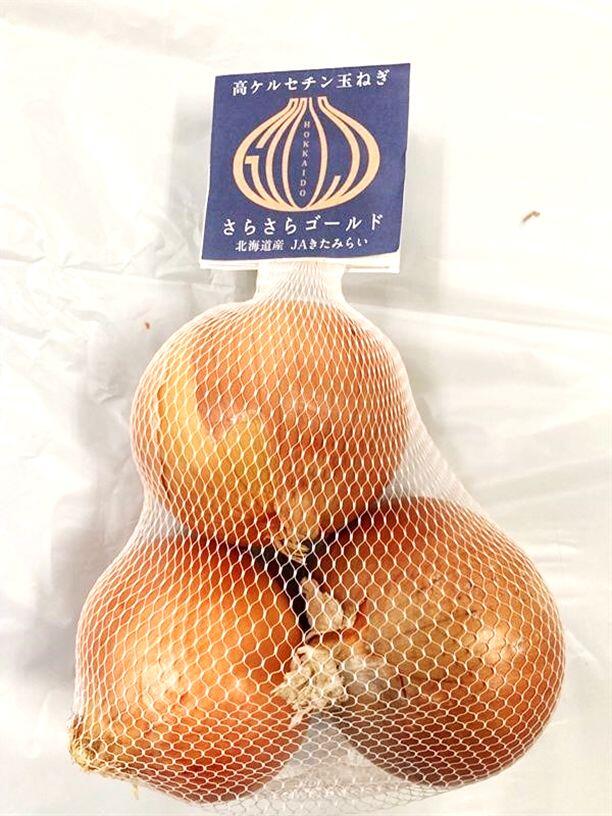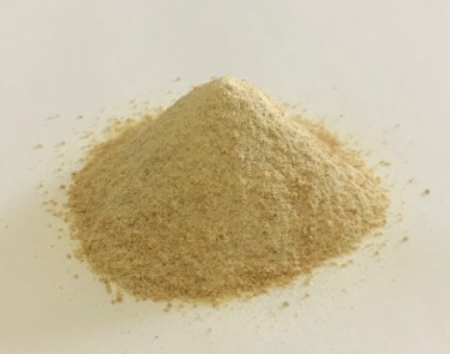There are about 36.4 million elderly persons aged 65 and over in Japan (September 2021, Ministry of Internal Affairs and Communications survey), accounting for about 30% of the population, and one in six reportedly suffers from dementia. With this background, joint research by NARO, Hokkaido Information University, Gifu University, etc. has revealed that quercetin contained in onions is useful for maintaining cognitive function that declines along with aging. Procedures are underway to sell onions that contain a large amount of quercetin as Foods with Function Claims.
Sarasara Gold has a large quantity of quercetin
Most yellow onions look the same, but the brand called "Sarasara Gold" grown in and around Kitami City in Hokkaido is sold with a stylish logo (Fig. 1) that exudes a premium image.
The most distinctive feature of this brand is that it contains more quercetin than other onions. Quercetin is a type of polyphenol that is found in vegetables, fruits, and green tea. It has antioxidant effects and can be expected to prevent lifestyle-related diseases, such as reducing the risk of mortality from ischemic heart disease.
Daisaku Okamoto, the president of Plant Breeding Institute Co., Ltd. (Kuriyama-cho, Hokkaido), who is also known as "The Onion Doctor", ordered more than 300 types of onions from all over the world and crossbred those with high quercetin content, leading to the cultivation of Sarasara Gold. Onions contain 10-50mg of quercetin per 100g, although there are differences depending on the production area and variety, whereas Sarasara Gold contains about 50mg per 100g stably. Thus, it is the brand with the highest quercetin content among onions grown in Japan.

Fig.1 Quercetin-rich onion "Sarasara Gold"
Confirmation of the effect of maintaining cognitive function in a clinical trial
In response to a report by Gifu University revealing that a diet mixed with quercetin improved cognitive function in aged mice, a research group consisting of Masuko Kobori, manager of the Division of Food Function Research at the Institute of Food Research, NARO (NFRI) (Tsukuba City, Ibaraki Prefecture) and Hokkaido Information University (Ebetsu City, Hokkaido) conducted a clinical trial with 70 healthy men and women aged 60 to 80. The 70 subjects were divided into two groups: one group was given 11g of quercetin-rich Sarasara Gold powder once daily (equivalent to 1/2 of a medium onion; the amount of quercetin is 50mg), and the other group was given the same amount of a quercetin-free white onion powder for 24 weeks, after which a cognitive function test was conducted. The study was a placebo-controlled, double-blind, parallel-group study with a high degree of reliability as neither the participants nor the persons in charge of the study knew which participants belonged to which group.
The results showed that the subjects who consumed the quercetin-rich powder (Fig.2) for 24 weeks scored higher on a cognitive function test than those who consumed the quercetin-free powder. This cognitive function test (mini-mental state examination) contains 11 questions such as "What day is it today?", "What region are you in?", "Please continue to subtract 7 from 100 in order." It is scored based on the number of correct responses.
The results showed that the maintenance of cognitive function by consumption of quercetin, which had been clarified by experiments by Gifu University on mice, was confirmed in humans.

Fig.2 Sarasara Gold powder
Helpful to maintain a positive mood
The study also examined the effects on the depressive state. The subjects who consumed the powder with high quercetin content had a greater reduction score of self-rating depression scales on a personal digital assistant-based cognitive assessment and less depression after 24 weeks in comparison with subjects who did not consume the powder. This indicates that quercetin supplementation provides assistance to maintain a positive mood. This cognitive function test is an application for mobile information terminals developed by Shimane University School of Medicine. It asks questions such as "Would you like to learn something new?" and respondents are asked to select a response from "No","Not so much", "Somewhat", and "Yes" to assess their state of mind. A score of 40 or higher is considered to be a mild depressive tendency.
The results of these studies suggest that regular consumption of quercetin-rich onions may help maintain cognitive function, which declines along with age, and maintain a positive mood.
Aiming to sell Foods with Functional Claims
Sarasara Gold is currently cultivated on approximately 10 ha by 17 farmers in and around Kitami City, Hokkaido. The 2021 harvest was about 417t. While this is a small amount when compared with that of Hokkaido, which supplies about 60% of the nation's onion production (approximately 840,000 tons), it is sold at supermarkets and department stores around the country from October to March of the following year.
In February 2022, Plant Breeding Institute Co., Ltd., the developer of Sarasara Gold, filed a notification to the Consumer Affairs Agency for Sarasara Gold as a food product with a functional claim allowing the function of helping maintain cognitive function to be displayed.
Masuko Kobori, manoger of the Division of Food Function Research at the Institute of Food Research, NARO (NFRI), who led the research, spoke about her expectations for the spread of the product in the future: "If eating onions, a familiar food, helps maintain cognitive function that declines along with age, it may lead to an extension of healthy life expectancy."
Project name
R&D matching funds on the field for Knowledge Integration and innovation
Project period
FY 2017 to 2020
Title
Development of a functional food that improves brain function
Leading research institutes
Institute of Food Research, NARO (NFRI), Tohoku Agricultural Research Center, NARO (TARC/NARO), Plant Breeding Institute Co., Ltd., Hokkaido Information University, Tokai National University Organization Gifu University, etc.
